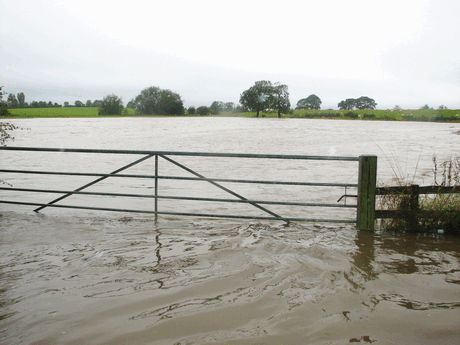Northern deluge maroons livestock

Northumberland farmer Bob Maxwell was forced to swim with cattle and sheep as he drove them to safety on the only remaining piece of high land on his farm near Wooler.
“There were hares and rabbits scrambling for safety alongside the stock,” he said. “It was an unbelievable sight. We’d already moved the cattle and sheep once but when we went back on Saturday night, expecting them to be OK, they were marooned by rising water. I’ve never seen so much rain come down so quickly.”
Mr Maxwell reckoned 8000 acres in the River Till valley were under water. At least 100 acres of his wheat were “totally submerged” and although he was still to discover how many of his sheep had drowned in the flood, he knew other farmers in the area faced even bigger stock losses.

Last weekend’s deluge came after one of the longest periods of wet summer weather northern farmers can remember. Tom Neill of Howtel Farm, near Wooler, still has at least 40% of his corn to harvest and said his land needed more than two weeks of dry weather before the combine could travel. His farm recorded over 100mm of rain in 24 hours last weekend.
“We’re heading into a major crisis for stock and arable farmers,” said Mr Neill. “Massive amounts of corn could be wasted and until it’s off the land, no one can get anything drilled for next year.”
Peter Hogg of Causey Park, near Morpeth, said: “I’ve never seen a summer and harvest time like this.” He has already spent £20,000 on fuel for his grain drier.
The incessant August rain has hit north-west farmers, too. Some dairy farmers who have been forced to bring cows inside say they have barely enough silage to feed their herds beyond Christmas.
Hill farmers in the Lake District say a winter fodder crisis is looming. The poor body condition of hill flocks gathered for weaning has shocked many.
Lake District farmer Stanley Jackson of Borrowdale has made less than half his winter fodder. “God knows how we’re all going to get through this winter,” he said. “There’s grass crop that should have been cut in July and it’s still there.
“The big problem now is a shortage of land to put weaned lambs onto. No one has any aftermaths. We’re all in a desperate situation.”
Yorkshire still has huge areas of crops left to harvest and some hill farmers in the dales are reported to have made no winter fodder at all.
North East under water
- Thousands of acres under water
- Many animals drowned
- Feed stocks won’t last winter

